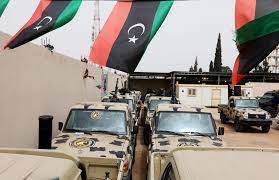

After more than a decade of dominance, armed groups controlling Tripoli have reached an agreement to vacate the Libya’s capital. Libya’s Interior Minister, Imad Trabelsi, announced the breakthrough following extensive negotiations.
Under the terms of the deal, which comes after a series of deadly clashes in the city in recent months, regular forces like the emergency police, city officers, and criminal investigators will take over security responsibilities in Tripoli to replace the militia presence.
The agreement also stipulates that at least five prominent armed groups, including the General Security Force, the Special Deterrence Force, Brigade 444, Brigade 111, and the Stability Support Authority, will depart Tripoli by the end of the holy month of Ramadan on April 9.
Speaking at a press conference, Minister Trabelsi emphasized that the militias’ role would be confined to their headquarters, with the government deploying them only in exceptional cases for specific missions.
He outlined plans for the gradual withdrawal of armed groups from Tripoli, with other cities to follow suit assureing that this transition would eliminate checkpoints and disarm armed groups along major roadways.
According to Trabelsi, the militias, known for their heavy weaponry and territorial control within the city, have contributed to its volatile security landscape.
The armed groups, while not under direct government control, have operated with a degree of autonomy. Their operational independence was sanctioned by a special status conferred upon them by the government in 2021.
However, their withdrawal from Tripoli marks a step towards restoring stability and governmental authority in Tripoli.
more recommended stories
 Somaliland’s Berbera Industrial Park: A New Era of Investment and Job Creation
Somaliland’s Berbera Industrial Park: A New Era of Investment and Job CreationThe Government of Somaliland, under the.
 President Irro’s Landmark Visit to UAE: A Diplomatic and Economic Win for Somaliland. Dubai, UAE – Somaliland’s Diplomatic Breakthrough
President Irro’s Landmark Visit to UAE: A Diplomatic and Economic Win for Somaliland. Dubai, UAE – Somaliland’s Diplomatic BreakthroughBy: Abdi Jama President Dr. Abdirahman.
 Kenya’s Unjustifiable Interference in Sudan: A Grave Violation of International Law and Regional Stability
Kenya’s Unjustifiable Interference in Sudan: A Grave Violation of International Law and Regional StabilityBy: Abdi Jama Kenya’s continued meddling.
 𝗙𝗼𝗿𝗺𝗲𝗿 𝗣𝗿𝗲𝘀𝗶𝗱𝗲𝗻𝘁 𝗠𝘂𝘀𝗲 𝗕𝗶𝗵𝗶’𝘀 𝗥𝗲𝗰𝗸𝗹𝗲𝘀𝘀 𝗔𝗰𝘁𝗶𝗼𝗻𝘀 𝗠𝘂𝘀𝘁 𝗡𝗼𝘁 𝗕𝗲 𝗜𝗴𝗻𝗼𝗿𝗲𝗱 – Abdihalim Musa
𝗙𝗼𝗿𝗺𝗲𝗿 𝗣𝗿𝗲𝘀𝗶𝗱𝗲𝗻𝘁 𝗠𝘂𝘀𝗲 𝗕𝗶𝗵𝗶’𝘀 𝗥𝗲𝗰𝗸𝗹𝗲𝘀𝘀 𝗔𝗰𝘁𝗶𝗼𝗻𝘀 𝗠𝘂𝘀𝘁 𝗡𝗼𝘁 𝗕𝗲 𝗜𝗴𝗻𝗼𝗿𝗲𝗱 – Abdihalim MusaYesterday, Somaliland witnessed a deeply troubling.

